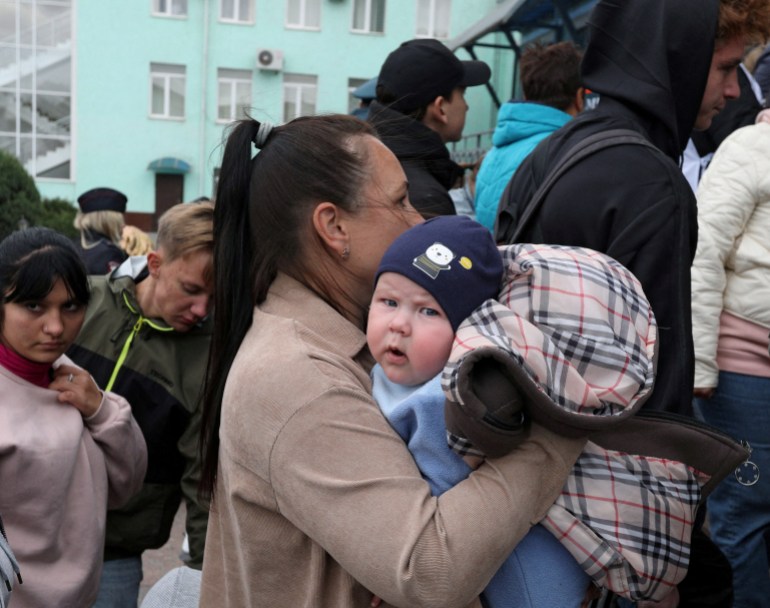Hundreds of thousands of people in central and western Ukraine are without power after Russia carried out missile and drone attacks.
Hundreds of thousands of people in central and western Ukraine are without power after Russia carried out massive drone and missile attacks, as intense fighting continues in the southeastern region of Luhansk, Donetsk and Kherson where Russia has been struggling to stop renewed Ukrainian advances.
Ukraine’s air force said in a statement on Saturday that Russia had launched “a massive missile attack” targeting “critical infrastructure”, hours after air raid sirens blared across the country. It said that it had downed 18 out of 33 cruise missiles launched from air and sea.
Local officials in regions across Ukraine reported strikes on energy facilities and power outages as engineers scrambled to restore the ruined network. Some advised residents to stock up on water in case of cuts.
Russia has intensified its attacks on power stations, water supply systems and other key infrastructure across the country since October 10, destroying one-third of Ukraine’s power stations in apparent retaliation to an attack on the Crimea bridge – a key military supply route – and recent advances made by Ukrainian forces.
After the first wave of missiles hit early in the morning, air raid sirens rang out again nationwide at 11.15am local time (08:15 GMT).
State grid operator Ukrenergo said the attacks targeted transmission infrastructure in western Ukraine, but that power supply restrictions were being put in place in 10 regions across the country, including in the capital, Kyiv.
“The scale of damage is comparable or may exceed the consequences of the attacks [between] October 10-12,” Ukrenergo wrote on the Telegram app, referring to the first wave of strikes on Ukraine’s power system last week.
“Another rocket attack from terrorists who are fighting against civilian infrastructure and people,” the Ukrainian president’s chief of staff, Andriy Yermak, wrote on the Telegram app.
The western city of Khmelnitsky, which straddles the Bug river and was home to some 275,000 people before the war, was left with no electricity, shortly after local media reported several loud explosions.
The city council urged residents to store water, “in case it’s also gone within an hour,” in a social media post on Saturday.
The mayor of Lutsk, a city of 215,000 in Ukraine’s far west, made a similar appeal on Telegram on Saturday. Power in Lutsk had been partially knocked out after Russian missiles slammed into local energy facilities, he said.
The central city of Uman, a key pilgrimage centre for Hasidic Jews which counted some 100,000 residents before the war, was also plunged into darkness after a rocket hit a nearby power station, regional authorities said on Telegram.
In comments to AFP news agency on Saturday, Ukrenergo said some parts of Ukraine are reducing their electricity use by up to 20 percent.
“We are grateful to both people, who have reduced their consumption at home, and to businesses, who are doing the same in their offices and workplaces. We see savings in different regions and on different days the level of voluntary consumption reduction ranges from five to 20 percent on average,” Ukrenergo chief Volodymyr Kudrytskyi said in written comments to AFP.
Earlier this week, President Volodymyr Zelenskyy called on consumers to curb their power use between 7am and 11am daily, and avoid using energy-guzzling appliances such as electric heaters.
Meanwhile, Russia’s defence ministry said on Saturday that its forces had repelled attempted Ukrainian offensives in the southern regions of Luhansk and Donetsk and the southern region of Kherson.
It said Russian forces had prevented an attempt by Ukraine to break through its line of defence in the Kherson region by the settlements of Piatykhatky, Sukhanove, Sablukivka and Bezvodne.
Ukrainian authorities say they have taken some 88 towns in the region. Al Jazeera could not independently verify reports from the battlefield.

Kherson is one of four Ukrainian territories illegally annexed by Moscow last month.
Russia and Ukraine have also accused each other of planning to blow up a huge dam in the Kherson region. President Volodymyr Zelenskyy has alleged that Russian forces are planting explosives in the Nova Kakhovka dam.
He warned its destruction would be catastrophic. Meanwhile, Russian-installed officials in Kherson have accused Ukraine of firing missiles at the dam.
Neither side has produced evidence for their claims.
Al Jazeera’s Kimberley Halkett reporting from the White House spoke to the National Security Council Coordinator for Strategic Communications John Kirby who said Russia’s attack on civilian infrastructure including alleged ones on the dam were “absolutely unacceptable”.
“It’s another example of Russian brutality against the Ukrainian people who he’s trying to strike fear into them and he’s trying to affect their ability to get through what will likely be a cold winter,” he said.



No comments:
Post a Comment
Note: only a member of this blog may post a comment.